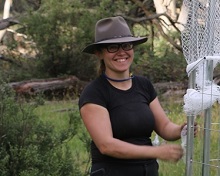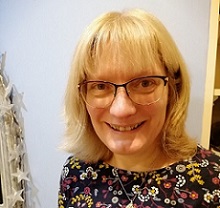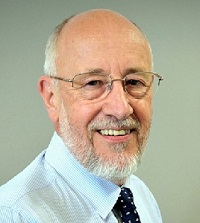Member profiles: Scavenger dynamics, medical research and networking
Our latest member profiles explore the working lives of zoologist Stefanie Bonat MRSB, science educator Laura Hibberts MRSB, and RSB Council Member Professor Nigel Brown CBiol FRSB
These profiles appeared in the Spring 2021 issue of The Biologist (Vol 68 No 1)
A Day in the Life
Stefanie Bonat MRSB on studying ‘mass-mortality events’ in the Australian wilderness

My work involves… research on carcasses – my PhD topic is ‘animal mass mortalities and their effects on scavenging food web dynamics’. I am currently setting up a field experiment that compares what happens to carcasses in different mass-mortality event scenarios – for example, when there are no vertebrate scavengers to consume carcasses or when invertebrate numbers are low. I will be looking at this from a food web perspective, assessing the flow-on effects these events can have on the environment.
On a typical day... I divide my time between fieldwork and my office or lab. I am based at the University of Sydney, but my field sites are in Kosciuszko National Park, a five-hour drive from campus. The raw data – such as invertebrate samples and camera trap images – is collected in the field, which needs to be processed in a lab afterwards.
Right now I am… In the field, setting up sites for my experiment. I am building cages to exclude vertebrate scavengers from some plots, and to reduce the numbers of invertebrates on carcasses. I am also surveying vegetation and collecting soil samples before putting carcasses out. We are sourcing deer carcasses from local land management programmes, as deer are considered as feral pests in Australia, but carcasses are often just left to rot on paddocks.
I work with… two laboratories, the Global Ecology Lab headed by Dr Thomas Newsome and the Ecosystem Dynamics Lab led by Dr Aaron Greenville, both at the University of Sydney. I collaborate closely with New South Wales National Parks and Wildlife Service and local landowners, who provide a lot of support for my project.
I also… undertake some contract work for National Parks and I look after RSB Australasia’s social media, creating and posting content that is relevant to our region. I am working with our committee to improve our reach in the region and to create more engagement for our followers.
After work… I like working out at the gym, and when I’m in the field I like to put up my hammock and spend time observing the wildlife around me. I also like watching television, from science-fiction and fantasy series to action movies.
The Career Ladder
Laura Hibberts MRSB on her journey from medical research to teaching

I first discovered biology through my grandmother. Although I do not remember her, I did inherit her 1929 history of medicine called Devils, Drugs and Doctors, from which I caught a lifelong interest in infectious disease. A year out, before university, working in the hospital operating theatre as an auxiliary nurse (even though I was squeamish to begin with) gave me first-hand experience of infection control procedures, and I took a degree in biochemistry and microbiology at the University of Leeds, where I fell in love with molecular biology.
I then studied for a PhD, examining the bacteria responsible for antibiotic-resistant infections on a hospital ward. I spent a summer determining the nucleotide sequences of beta-lactamase enzymes produced by these bacteria (before automatic sequencing). I’ll never forget the excitement of watching my x-ray film autoradiographs develop in the dark room and seeing the barcode-like DNA bands emerge. It was such a thrill to read these sequences (by hand), especially when I found a previously undiscovered enzyme!
During my PhD I taught undergraduates and found this highly enjoyable. I began teaching for the Open University and stayed with them for 11 years. My PhD was followed by a postdoc on ulcerative colitis at Leeds, which I combined with lecturing in microbiology and molecular biology at Bradford University.
A pivotal point in my career was when I started a family and moved to Stoke-on-Trent. I took part-time work, which acted as my intellectual lifeline, working in smoking cessation for the NHS and teaching Access to HE courses at Stoke-on-Trent College. Here I gained my PGCE, which enabled me to get my next position as a sixth-form biology teacher at a private school. As the sixth form folded, my younger son’s complex care needs increased and for a year I could only work as a private tutor. My big break came when I landed a teaching fellow job at Keele University’s School of Medicine, and from there was able to get a lectureship on Keele’s foundation year. I now lead all the life sciences modules for the foundation year, including one that has a strong emphasis on microbiology. I love sharing my enthusiasms with my students and I think I have the best job in the world.
My advice is never give up on your career; focus on what you can do and not on what you can’t; and remember that no experience, however humble, is ever truly wasted.
My Society and Me
Professor Nigel Brown CBiol FRSB on representing the Society’s branches

As a member of RSB Council and chair of the College of Individual Members I have oversight of the 19 RSB branches and represent them and their members to Council. I am now in ‘active retirement’ after a lifetime in academic research and have been a Fellow of the RSB and its predecessors since 1989. The Society provided a local network and helped with wider contacts, including industry funders.
My early activities in learned societies were in my specialism, but I was keen to take a wider role and election to the RSB Council provided that. It enabled me to give back to a system that has supported me. Council members are trustees and we ensure that the RSB continues to operate in support of its charitable objectives.
We are supported by an excellent staff. I have just been elected to a second term on Council and I will continue to support the branches. It has been a pleasure to attend some of their meetings and see the excellent work being done by volunteers. As well as a variety of lectures, quizzes and ‘meet the committee’ events, this year I have also been able to attend every branch AGM – by Zoom – including those of the Hong Kong and Australasia branches. Virtual meetings may well be here to stay!


